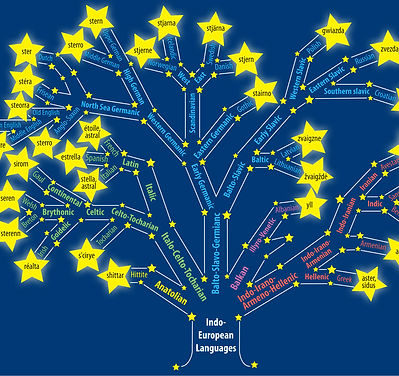Bay Area Folx! Join us on March 18, 2025 for a special IRL event for integrating magic and mystical into your life and business. More info here.
Etymology: Word Evolution

“Language has preserved for us the inner, living history of a man's soul. It reveals the evolution of consciousness."
- Owen Barfield
For as long as I can remember I have been fascinated with words. As a logophile (word lover) I makeup words, look for words within words, and sometimes spend hours with the Oxford English Dictionary for fun.
I feel something in words…while many people may just see letters, I see magic and sacred symbols. English is not often thought of as a “sacred” language such as Sanskrit or Hebrew, though it contains the same roots and base symbols. The holy form of the letters exists today as English and the alphabet evolved from Hebrew, Greek, Latin, and Teutonic Runes.
Philosopher Max Weber would consider most of us “disenchanted.” Meaning as humans we don’t often see the world as enchanted…or full of meaning or magic. For most of us, we experience the world as a meaningless and made up of individual objects. English reflects this perception of the world as it contains the most nouns of any language.
I’m interested in how we can re-enchant ourselves with life again, and I believe we can do it through language. We begin to notice our words are not just abstract ideas but contain a consciousness and experience of the past very different from the one we speak now.
Etymologies offer this insight, or as philosopher Owen Barfield said, “to excavate the information buried in a word.” Desire is not just "wanting something" but is to “await what the stars bring.” In the time this word came into usage many people believed the stars were our ancestors (which we know to be true to some extent). The way it is used now feels so different and yet the older meaning is still alive in what we say.
Many words have powerful etymologies that take us back in time to a different consciousness and experience of life. A debate in academia and linguistic communities centers around language as being one of the key evolutionary elements that reveal humans’ disconnection to the universe (coming from Latin univers meaning “the many folding into one”). If it was indeed language that helped contribute to the feelings of isolation and loneliness so many of us face, perhaps words and language are also our way back into a sense of enchantment and connection.
Abstract/Summary (or read full text here in PDF):
Modern, Western people often conceive the universe as a mindless void full of lifeless objects. This mistaken conception perpetuates a deep-seated loneliness and disconnection from the larger universe. German philosopher and sociologist Max Weber (1864-1920) used the term disenchantment to describe how modern humans experience the universe without any magical or mystical explanations for its or their own existence. Mythology, religion, philosophy, and science are all attempts to orient to myriad beings and the vast universe. Thus far, none of these endeavors has provided an adequate feeling of being at home in the universe.
Many scholars of language have attributed the disenchantment of the world with the invention of the alphabet and the formation of language. This thesis argues it was not language that separated humans from the universe, but instead a changing relationship to the stars. The works of philologist Owen Barfield (1898-1997) focus specifically on word etymology and offer insights into humanity's ever-evolving consciousness and correlating worldview orientations. His studies reveal meaningful correlations between the way humans think and their vocabularies.
Since the earliest recorded Proto-Indo-European language, Sanskrit, the word star has remained the same in its meaning and transliteration into English. Through a brief linguistic explanation of how the word star came into modern English, it is possible to appreciate not only its history but the mystical power of the word itself. When correlated with humanity's most original worldview orientation, the word star brings back the language and consciousness of our early ancestors whose influence might otherwise be forgotten. Behind words and letters that seem to signify a lifeless, meaningless universe, is a worldview imbued with sacredness. This thesis argues for the revival and excavation of English etymologies (through Barfieldian philology) and an appreciation of language itself to move humanity towards a re-enchanted relationship with the stars and the larger universe.
---------
To read more about my theory of re-enchantment read my thesis Stargazing: Re-enchantment through language
{Image by the talented designer and artist Darrin Drda, commissioned for my thesis.}
QUIZ: ARE YOU ETYMOLOGICALLY ENCHANTED?
How well do you know the hidden world of words?

Word from Proto-Indo-European were meaning "speak or say"
_edited.png)